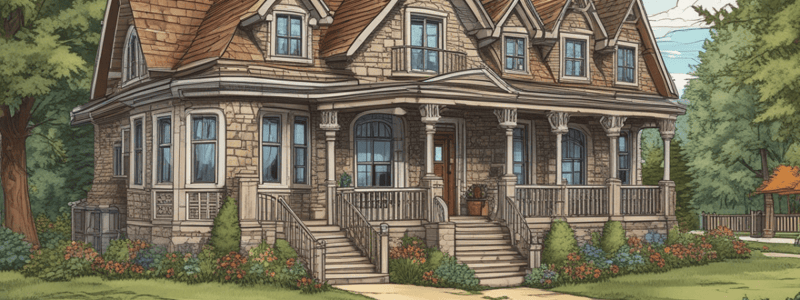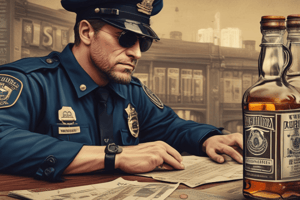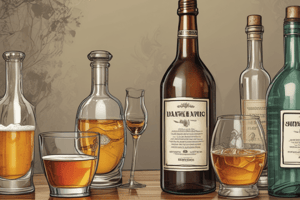Podcast
Questions and Answers
What is prohibited under unlawful consumption laws?
What is prohibited under unlawful consumption laws?
- Distributing liquor to minors
- Drinking alcohol in a form that is not liquor (correct)
- Consuming liquor at public events
- Drinking any form of alcohol
Which of the following actions is illegal for a person under 19 years of age?
Which of the following actions is illegal for a person under 19 years of age?
- Sharing liquor with peers
- Having a friend buy liquor for them
- Consuming alcohol at a private event
- Purchasing liquor (correct)
What does unlawful supply entail?
What does unlawful supply entail?
- Giving alcohol as a gift
- Supplying alcohol in a form that is not liquor (correct)
- Selling liquor to adults
- Supplying liquor to minors
Which statement is correct regarding the penalties for youth under 19?
Which statement is correct regarding the penalties for youth under 19?
Under what condition can a police officer refer a youth to a prevention program?
Under what condition can a police officer refer a youth to a prevention program?
What is included under the actions prohibited for those under 19?
What is included under the actions prohibited for those under 19?
Which of the following is NOT a reason for a police officer to act under section 72(1)?
Which of the following is NOT a reason for a police officer to act under section 72(1)?
What does the acronym 'P O A C H' represent in the context of under 19 offenses?
What does the acronym 'P O A C H' represent in the context of under 19 offenses?
What age is defined as 'under 19 years' as per the liquor regulations?
What age is defined as 'under 19 years' as per the liquor regulations?
Which action is explicitly prohibited under the unlawful consumption rules?
Which action is explicitly prohibited under the unlawful consumption rules?
What encompasses the term 'liquor' under the Liquor Licence Act?
What encompasses the term 'liquor' under the Liquor Licence Act?
Which of the following is not considered a 'private place'?
Which of the following is not considered a 'private place'?
What does 'fermentation' primarily produce?
What does 'fermentation' primarily produce?
Under the unlawful conveyance exemptions, which statement is true?
Under the unlawful conveyance exemptions, which statement is true?
What is defined as a 'closed container'?
What is defined as a 'closed container'?
Which of the following accurately describes a 'motor vehicle' under the Liquor Licence Act?
Which of the following accurately describes a 'motor vehicle' under the Liquor Licence Act?
What does 'possession' refer to in the context of liquor laws?
What does 'possession' refer to in the context of liquor laws?
What type of container state is described as 'unopened'?
What type of container state is described as 'unopened'?
In which scenario is possession exemption applicable?
In which scenario is possession exemption applicable?
Which type of place allows for public invitation at specific times?
Which type of place allows for public invitation at specific times?
What must be true for liquor to be stored anywhere on a vessel?
What must be true for liquor to be stored anywhere on a vessel?
Which of the following actions is permissible for individuals under 19 years of age?
Which of the following actions is permissible for individuals under 19 years of age?
Under which circumstance can a police officer arrest someone for public intoxication?
Under which circumstance can a police officer arrest someone for public intoxication?
What is the requirement for a police officer to seize items related to an offense?
What is the requirement for a police officer to seize items related to an offense?
What must a person do to avoid being taken to a detox center?
What must a person do to avoid being taken to a detox center?
Which of the following scenarios would allow for a police officer to search a vehicle?
Which of the following scenarios would allow for a police officer to search a vehicle?
What happens if someone fails to provide their identity to law enforcement?
What happens if someone fails to provide their identity to law enforcement?
Which of the following is prohibited under unlawful supply laws?
Which of the following is prohibited under unlawful supply laws?
What is one exemption for individuals under 19 related to liquor possession?
What is one exemption for individuals under 19 related to liquor possession?
Which is NOT a condition that allows a police officer to carry out an arrest for intoxication?
Which is NOT a condition that allows a police officer to carry out an arrest for intoxication?
Flashcards
Residential Tenancies Act (RTA)
Residential Tenancies Act (RTA)
Governs landlord-tenant relationships, defining terms, rights, and responsibilities.
Landlord Property Seizure
Landlord Property Seizure
Landlords cannot seize tenant property for unpaid rent; they must take legal action.
Police Role in RTA Disputes
Police Role in RTA Disputes
Police keep the peace, remain impartial, avoid legal advice, and focus on safety and property protection.
Landlord Entry Without Notice
Landlord Entry Without Notice
Signup and view all the flashcards
Liquor (LLCA Definition)
Liquor (LLCA Definition)
Signup and view all the flashcards
Beer (LLCA)
Beer (LLCA)
Signup and view all the flashcards
Wine (LLCA)
Wine (LLCA)
Signup and view all the flashcards
Selling/Purchasing Liquor Legally
Selling/Purchasing Liquor Legally
Signup and view all the flashcards
Underage Alcohol Prohibition
Underage Alcohol Prohibition
Signup and view all the flashcards
Residence (LLCA)
Residence (LLCA)
Signup and view all the flashcards
Indoor Private Place (LLCA)
Indoor Private Place (LLCA)
Signup and view all the flashcards
Private Place in Motor Vehicle (LLCA)
Private Place in Motor Vehicle (LLCA)
Signup and view all the flashcards
Private Place on Boat (LLCA)
Private Place on Boat (LLCA)
Signup and view all the flashcards
Unopened Container (LLCA)
Unopened Container (LLCA)
Signup and view all the flashcards
Closed Container (LLCA)
Closed Container (LLCA)
Signup and view all the flashcards
Open Container (LLCA)
Open Container (LLCA)
Signup and view all the flashcards
Possession (LLCA)
Possession (LLCA)
Signup and view all the flashcards
Exemption to Possession Laws
Exemption to Possession Laws
Signup and view all the flashcards
Motor Vehicle Liquor Rules
Motor Vehicle Liquor Rules
Signup and view all the flashcards
Liquor Storage on Boat
Liquor Storage on Boat
Signup and view all the flashcards
Unlawful Consumption (LLCA)
Unlawful Consumption (LLCA)
Signup and view all the flashcards
Unlawful Supply
Unlawful Supply
Signup and view all the flashcards
Under 19 Prohibitions
Under 19 Prohibitions
Signup and view all the flashcards
Under 19 Exemptions (Parental)
Under 19 Exemptions (Parental)
Signup and view all the flashcards
Public Intoxication Arrest
Public Intoxication Arrest
Signup and view all the flashcards
Fail to Identify (LLCA)
Fail to Identify (LLCA)
Signup and view all the flashcards
Seizure Authority(LLCA)
Seizure Authority(LLCA)
Signup and view all the flashcards
Detox Centre (LLCA)
Detox Centre (LLCA)
Signup and view all the flashcards
Vehicle Search Authority
Vehicle Search Authority
Signup and view all the flashcards
Detox vs. Charges
Detox vs. Charges
Signup and view all the flashcards
Study Notes
Residential Tenancies Act (RTA) Overview
- RTA governs landlord-tenant relationships, including definitions of terms, rights, and responsibilities.
- Applicable to stays in hotels or motels under specific circumstances defined by the Act.
- Owners who rent part of their home may not be covered if they live on the premises and certain conditions apply.
Rights of Landlords and Tenants
- Landlords cannot seize tenant property for unpaid rent; legal action is required.
- Police can enforce eviction orders obtained by landlords but cannot evict tenants directly for causing “wilful damage.”
Police Role in RTA Disputes
- Police must keep the peace, remain impartial, and avoid providing legal advice.
- They can check documentation and offer referrals but focus on safety and property protection.
- Police evidence may be necessary at tribunal or court proceedings.
Landlord Access to Rental Units
- Landlords can enter rental units without written notice under specific conditions related to notice of termination and reasonable effort to inform tenants.
- Entry for showings is limited to designated hours with prior notice when applicable.
Landlord and Tenant Resources
- Landlord and Tenant Board
- Ministry of Municipal Affairs and Housing Investigative Unit
- Citizen's Inquiry Line
- Landlord’s Self-Help Centre
Liquor Licence and Control Act (LLCA) Essentials
- Defines liquor as any alcohol suitable for human consumption, including beer, wine, and spirits.
- Alcohol is derived from the fermentation or distillation of various agricultural products, including synthetic ethyl alcohol.
Definitions of Alcoholic Beverages
- Beer: Alcohol beverage from fermentation of barley, malt, or hops, exceeding a prescribed level (0.5 of 1% v/v).
- Wine: Alcoholic beverage from natural fruit sugars, also exceeding the prescribed amount (0.5 of 1% v/v).
- Spirits: Distilled alcohol beverages.
Legal Aspects of Selling and Purchasing Liquor
- Selling liquor requires a licence or permit.
- Purchase is restricted to authorized sellers, such as LCBO or those holding valid permits.
- Individuals can only possess liquor from lawful sources for personal use.
Alcohol Consumption Laws for Minors
- Individuals under 19 cannot have, consume, or purchase liquor.
- Youth education programs may be offered as an alternative penalty for offenders under 19 caught violating liquor laws.
Summary of Offences Under the LLCA
- Clear prohibitions on underage access to liquor (purchase, possess, consume).
- Violations lead to legal consequences, with possible diversion programs for youth.
Liquor Licence Act Overview
- Liquor Definition: Includes Spirits, Wine, Beer, and any alcohol suitable for human consumption; encompasses both natural and synthetic ethyl alcohol.
- Alcohol Production: Derived from fermentation or distillation of agricultural products like grains and fruits.
Types of Alcohol Production
- Fermentation: Process used to produce Beer and Wine.
- Distillation: Process utilized for making Spirits.
Definitions of Residence
- Residence: A dwelling place actively occupied, including all associated premises not open to the public. This extends to nearby land if a tent is present.
Definitions of Private Places
- Indoor Private Place: Not ordinarily open to the public, except during specific times when access is permitted; excludes venues rented for public use.
- Private Place in Motor Vehicle: Must include sleeping accommodations and cooking facilities; used as a residence off the highway.
- Private Place on Boat: Requires permanent sleeping, cooking, and sanitary facilities, anchored or secured.
Container Types
- Unopened: Container has an unbroken seal.
- Closed Container: Liquor contained but could be opened.
- Open Container: Liquor is accessible and no longer sealed.
Possession of Liquor
- Possession Defined: Involves knowledge, consent, and control of the liquor.
- Exemption: Closed containers with liquor are exempt from certain possession laws; carrying a partially full bottle in a closed state is permissible.
Unlawful Conveyance Exemptions
- Motor Vehicle Guidelines:
- Unopened liquor containers with unbroken seals may be stored anywhere in the vehicle.
- If the seal is broken, liquor must be stored in a closed, fastened bag and not readily accessible to occupants.
Boat "Underway"
- Unopened liquor containers can be stored anywhere on a boat, provided the seal remains unbroken.
- If the liquor seal is broken, it must be stored in a closed compartment; no locking is required.
Unlawful Consumption
- Consumption of alcohol-containing products that are not classified as liquor, such as mouthwash, is prohibited.
Unlawful Supply
- It is illegal to provide alcohol in a non-liquor form, knowing it will be consumed.
Under 19 Offences
- Individuals under 19 are prohibited from purchasing, obtaining, attempting to purchase, consuming, or possessing alcohol.
Under 19 Exemptions
- Persons aged 18 may possess liquor at an authorized selling place during employment.
- Parents or legal custodians can supply liquor to persons under 19 in private residences; it must only be consumed by the recipient and requires no supervision.
Arrest Authorities
- A person can be arrested for public intoxication if they are intoxicated, in a public area, and their arrest is necessary for safety.
Fail to Identify
- A person found in violation of the Act must identify themselves; failure or providing false identification can lead to legal consequences.
Seizure Authority
- Authorities can seize items if they are evidence of an offense, to prevent ongoing illegal activity, or include proceeds of an offense.
Detox Centre
- Compliance is required for individuals being taken to detox facilities; authorities may take individuals to designated hospitals instead of laying charges.
Search Authority
- Police officers, with reasonable grounds, have the authority to search a boat or vehicle and all occupants if they suspect unlawful liquor storage.
Studying That Suits You
Use AI to generate personalized quizzes and flashcards to suit your learning preferences.






